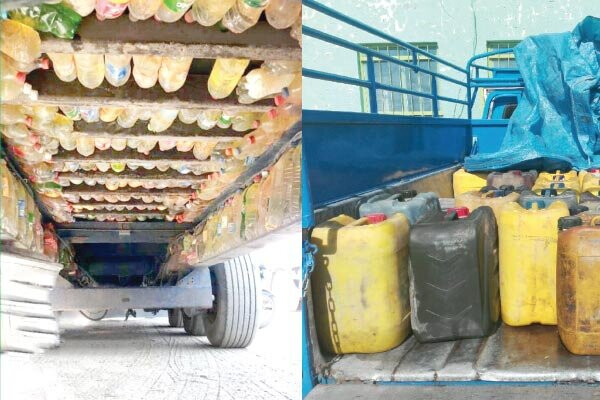
Mexico City – A staggering report by PetroIntelligence, a Mexican market intelligence firm specializing in the gasoline and transportation sectors, has revealed the immense financial toll that fuel smuggling and theft are taking on the Mexican treasury. According to their analysis, the nation is losing approximately US $24 million dollars every day due to these illicit activities.
The report estimates that Mexico forfeited over 177 billion pesos in potential tax revenue in the past year alone. This figure represents a substantial 44% of all taxes collected from gasoline and diesel sales across the country in 2024, highlighting the massive scale of the tax evasion.
Adding to this financial hemorrhage, state-owned oil company Pemex has reported daily losses of nearly US $900,000 due to direct fuel theft from its pipelines. The combined losses underscore the significant challenge facing Mexican authorities in their efforts to combat these criminal enterprises.
PetroIntelligence, known for its popular app that allows consumers to compare fuel prices and report irregularities, also provides crucial analysis to players within the oil industry. Their recent report, titled “Analysis of potential tax collection from fiscal contraband,” published in February, laid bare the extent of the tax losses.
The calculations are based on an estimate by Mexico’s Tax Administration Service (SAT) indicating that contraband fuel accounts for a significant 30% of total fuel sales in the country. PetroIntelligence concluded that the primary method of tax evasion is the smuggling of illicit fuel from the United States. In contrast, fuel siphoned from Pemex pipelines, often sold on the black market or at discounted prices, allows for some tax collection, albeit illegally obtained in the first place.
The problem of fuel theft, widely known as "huachicoleo" in Mexico, has plagued Pemex for years, witnessing a sharp increase over the last fifteen years with the deepening involvement of organized crime syndicates. Fuel smuggling, now termed "huachicoleo fiscal," has seen a parallel rise in recent years, even as former President Andrés Manuel López Obrador (2018-2024) asserted his administration's intensified efforts against these illegal practices.
Despite López Obrador's claims of near-eradication of fuel theft, critics have consistently questioned the efficacy and legitimacy of the government's crackdown. Their skepticism was further fueled by the significant seizure of 18 million liters of contraband fuel in two separate major operations last month.
These substantial busts – the first occurring in Ensenada, Baja California, on March 26th, and the second in Altamira, Tamaulipas, on March 31st – took place nearly two months after President Claudia Sheinbaum declared a heightened offensive against fuel thieves.
Reports indicate that the joint operation, involving the Navy, the Federal Attorney General’s Office, and the Security Ministry, unearthed crucial details about the illegal operations, allegedly implicating the notorious Jalisco New Generation Cartel.
Furthermore, Mexico’s Naval Intelligence Unit has identified two additional ports – Tampico, Tamaulipas, and Guaymas, Sonora – as key hubs in a sophisticated fuel smuggling network. This network reportedly involves a range of actors, including importers, exporters, port authorities, and customs officials, highlighting the deep-rooted corruption facilitating these crimes.
The PetroIntelligence report and the recent large-scale seizures underscore the persistent and complex nature of fuel smuggling and theft in Mexico. The significant daily financial losses represent a considerable drain on the national treasury, diverting funds that could otherwise be allocated to essential public services. President Sheinbaum's renewed commitment to combating these illegal activities faces a formidable challenge in dismantling the well-established networks and addressing the underlying corruption that enables them to thrive. The coming months will be crucial in determining the effectiveness of the government's intensified efforts to curb "huachicoleo" in its various forms and reclaim the substantial revenues currently being lost.
[Copyright (c) Global Economic Times. All Rights Reserved.]






























